Die Situation im Lager der Mertenstr. 63 (13587, Spandau – Berlin), betrieben von der Berliner Stadtmission, ist unerträglich. Verantwortlich für diese Situation sind Elke Breitenbach und die gesamte Regierung von Berlin.
Hunderte von Menschen leben noch immer dort (einige von ihnen seit mehr als 2 Jahren!) und warten darauf, dass dieses Lager geschlossen wird, nachdem ihre Anträge auf einen Transfer in ein dauerhaftes Wohnheim wiederholt vom LaGeSo abgelehnt wurden. Das Lager sollte bereits geschlossen worden sein, denn die Bedingungen für die Hunderte von Menschen, die in solchen Hangars unter schlechten Lebensbedingungen leben, sind unmenschlich – aber die Verwaltung des Lagers, in Zusammenarbeit mit dem LAF und dem Berliner Senat, hält das Geschäft am Laufen.
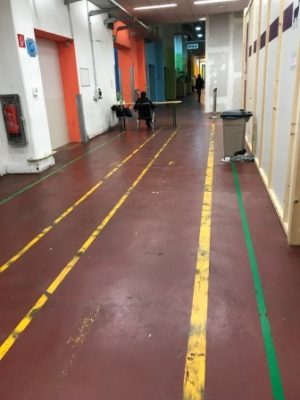
Die Lebensbedingungen sind sehr schlecht, genau wie in allen anderen Lagern. Gerade in diesem Fall leiden die Bewohner*innen unter einem enormen psychologischen Druck und es gab bereits mehrere Selbstmordversuche, die teilweise erfolgreich waren. Es ist auch durchaus üblich, dass im Inneren des Lagers Drogen aufzufinden sind.
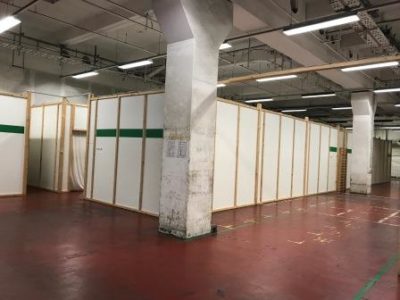
Die Verwaltung des Lagers, also die Berliner Stadtmission, erlaubt den darin lebenden Menschen nicht, Besucher*innen zu empfangen. Dies provoziert eine Segregation und einen Ausschluss aus der Gesellschaft, der jeden Versuch der Integration oder Inklusion verhindert.
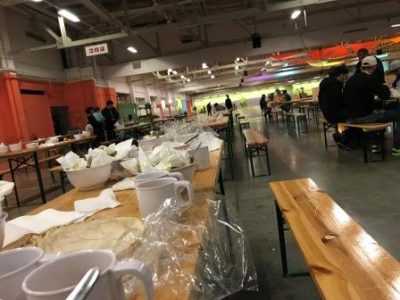
Es gibt nur einen gemeinsamen Bereich mit Zugang zum Internet, was es schwierig macht, etwas Privatsphäre zu haben. Die Zimmer werden mit Personen geteilt und die Wände sind sehr dünn.
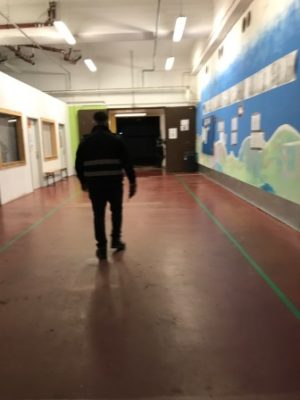
Die Zimmer haben keine Türen, was es Dieben ermöglicht, jederzeit einzutreten und nach Belieben zu stehlen. Dies geschah wiederholt in den Nächten, in denen das Licht ausgeschaltet wurde. Dies führt auch zu Sicherheitsproblemen – vor allem, wenn man bedenkt, dass das Sicherheitsunternehmen SGB Schutz & Sicherheit GmbH mehr an der Kontrolle der dort lebenden Menschen als an der Schaffung eines sicheren Raumes interessiert ist. Wenn z.B. jemand einem Bewohner*einer Bewohnerin sein*ihr Telefon stiehlt, erklären sie der betroffenen Person, dass sie die Polizei anrufen sollte. Die Schlussfolgerung der im Lager lebenden Leute lautet, dass dieses Lager wie ein Gefängnis ist. Darüber hinaus ist das Sicherheitspersonal nicht professionell geschult, die Menschenwürde zu respektieren, wenn ein Vorfall eintritt. Sie nutzen ihre Macht und tun so, als ob die betroffenen Personen kriminell wären. Vor allem die Bewohner*innen des Lagers leiden unter einem solchen Verhalten, weil sie befürchten, dass es negative Auswirkungen auf ihre Asylanträge haben wird und niemand ihre Stimme hört, weil sie als Flüchtlinge gesehen werden.
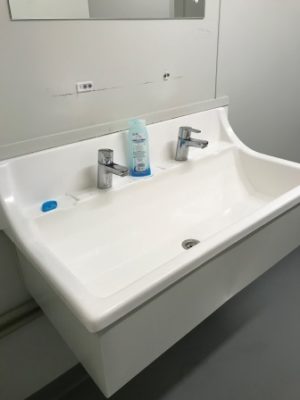
Die hygienischen Bedingungen sind ebenfalls sehr schlecht, da es im Lager nicht genügend sanitäre Einrichtungen für 600 Menschen gibt, die auf demselben Raum leben. Das Lager ist voller Insekten und Krankheiten. Über hundert Menschen haben eine Petition zur Verbesserung der Lebensbedingungen eingereicht und sich über Insekten im Lager beschwert, aber das LAF kümmerte sich nicht um ihre Petition. Auch die Bedingungen für die Einhaltung der persönlichen Hygiene der Menschen sind nicht zufriedenstellend: So hat z.B. die Seife und das Shampoo, die das Lagermanagement liefert, eine so schlechte Qualität, dass man sie lieber direkt in den Müll wirft.
Das Essen ist auch in diesem Lager ein großes Problem. Es gab einige Proteste gegen die schlechte Qualität: Bei diesen Protesten weigerten sich die Beteiligten, die Lebensmittel zu essen und viele Menschen aus verschiedenen Ländern schlossen sich dem Protest gegen diese Bedingungen an. Wie bei anderen Protesten wurde auch hier mit der Entsendung von Menschen ins Lager nach Tempelhof gedroht und die Drohung wurde für einen afrikanischen Asylsuchenden, der sich organisiert hatte, zur Realität.
Man sagt, dass dieses Lager eine Notunterkunft ist, aber einige Leute leben dort seit 2015. Die Lagerleitung (unter der Verantwortung der Berliner Stadtmission) sollte die Qualitätsstandards erfüllen, die vom
LAF aufgestellt wurden, aber das ist nicht der Fall. Einige der Punkte, in denen diese Standards nicht erfüllt werden, sind die folgenden:
- Es gibt nicht nur keine sichtbare Erste-Hilfe-Ausrüstung im Lager, sondern auch nur eine sehr rudimentäre und begrenzte Erste-Hilfe Ausrüstung, die in den Räumlichkeiten der Leitung des Lagers zur Verfügung steht. z.B. gibt es Verbandsmaterial für nicht einmal 3 Personen, obwohl Hunderte von Menschen in diesem Lager leben.
- Die Lagerleitung sorgt nicht dafür, dass Sport- und Spielanlagen von Experten inspiziert werden.
- Einige Leute haben bei ihrer Ankunft die “Hausregeln” ihres Lagers nicht in ihrer Muttersprache erhalten.
- Personen werden nicht darüber informiert, dass ihre persönlichen Daten für finanzielle Berechnungen des Landes Berlin erhoben werden.
- Die Menschen wissen nicht, dass ihre nicht-personenbezogenen Daten gesammelt werden, um der Presse oder bei anderen schriftlichen offiziellen Anfragen kommuniziert zu werden.
- Personen werden nicht darüber informiert, dass ihre Daten für die legale Registrierung (bei der Meldebehörde) verwendet werden.
- Sie wurden nicht informiert, dass es im Lager ein Kamerasystem (CCTV) gibt.
- Es wird kein richtiges Erste-Hilfe-Material zur Verfügung gestellt.
- Es gibt keine Notrufnummern, die offen und sichtbar angezeigt werden.
- Im Lager gibt es keinen Aufzug.
- Menschen erhalten keine Informationen über den Brandschutz in ihrer Sprache.
- Die Lagerleitung führt keine Brandschutzübungen durch.
- Die Lagerleitung stellt weder eine Krippe (für Babys), noch individuelle Leselampen zur Verfügung.
Berliner Stadtmission is segregating in Spandau!
The situation in the Lager of Mertenstr. 63 (13587, Spandau – Berlin), ran by the Berliner Stadtmission, is no longer sustainable. Elke Breitenbach and the whole government of Berlin are responsible of this situation.
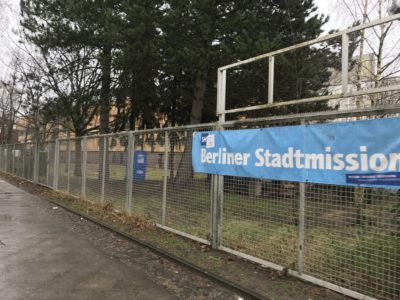
Hundreds of people are still living there (some of them for more than 2 years!), waiting for this Lager to close, after their applications for transferring to permanent Wohnheim repeatedly rejected by LaGESO . The Lager should be already closed, because the conditions of hundreds of people living in this kind of hangars with poor living circumstances are inhuman, but the administration of the Lager, with the cooperation of LAF and the Berliner Senat, keeps the business running.

The living conditions are very bad, just as it happens in all the other Lagers. In this one in particular, the residents have been suffering from a huge psychological pressure, and there have already been several suicide attempts which succeeded in some cases. It is also quite common that there are drugs inside the Lager.

The administration of the Lager, from Berliner Stadtmission, doesn’t allow visitors of the people living inside. This provokes a segregation and a exclusion of the society that goes against every integration or
inclusion initiative.

There is just one common area with access to the internet, making it difficult to have some privacy. Rooms are shared with persons, and the walls are very very thin.

The rooms do not have doors which encourage thief to enter at any time and pick what he/she wants. This has repeatedly happened during the nights when the lights turn off. This leads also to security problem, specially if we have in mind that the security company, SGB Schutz & Sicherheit GmbH, is more interested in controlling the people living there than in creating a secure space. For example, when someone steals your phone, they tell you that you should call the police The conclusion of the people living inside is that this Lager is like a jail. In addition, the security personal is not professionally trained to respect human dignity when an incident happens, they use their power and pretend the person as criminal and most importantly the residents of the camp suffer such behave due to the fear that it will have a negative impact on my asylum case and nobody hears their voice because they are refugee.

The hygiene conditions are also very bad, as there are not enough sanitary installations for 600 hundreds of people living in the same space. The Lager is full of insects and diseases. Over hundred people made a petition for betterment of the living condition and complained over insects in the camp but the LAF did not care about their petition. The personal hygiene of the people is also not satisfactory: for example, the soap and the shampoo delivered by the Lager has such a horrible poor quality, that people just throw it directly to the trash.
The food is has been also a big problem in this Lager. There has been some protests against the low quality of it: in these protests, they refused to eat the food and a lot of people from different countries joined against these conditions. As in other protests, people were threaten to be sent to Tempelhof, and the threat became a reality for an African asylum seeker who organized was part of the protests.
They say that this Lager is a Notunterkunft, but some people live there since 2015. Therefore, the camp management (under the responsability of Berliner Stadtmission) should fulfil the quality standards set up by
LAF (link), but this is not the case. Some of the points where these standards are not fulfilled are the following:
- There is not only visible First-Aid-Equipment in the camp but also very initial and limited First-Aid-Equipment available in the management of the camp. For example they do not have bandage for more than 3 people while hundreds of people are living this camp.
- The camp management doesn’t ensure inspection of sports and playing facilities by experts
- Some people didn’t receive the “House rules” of their camp in their native language when they arrived
- People are not informed that their personal data is collected for financial calculations of the state of Berlin
- People don’t know that their non-personal data is being collected to be communicated with the press or other written official requests
- People are not informed that their data is used for their legal registration (at the local “Meldebehörde”)
- They were not informed that there is a camera-system (CCTV) in thei camp
- There is no proper First-Aid-Material provided
- There are no emergency numbers displayed openly and visibly
- There is no lift in the Lager
- People don’t receive information about fire safety in their language
- The camp management doesn’t conduct fire prevention exercises
- The camp management doesn’t provide a crib (for babies), nor individual reading lights
- The camp management doesn’t provide a room with a table and seats
- The camp management doesn’t provide a room with a lockable cup-board (minimum size per person: 50 x 180 x 55 cm)
- People don’t have a countertop for the preparation of food and drink
- People don’t have access to cooling equipment, including a freezer with a volume of 20 to 30 liters per person
- There is not a sink for each 7 people
- There is no toilet place for people with disabilities
- There is no toilet place for all genders
- The camp management doesn’t provide enough hygiene accessories (toilet brush, lockable hygiene trash cans, wall hooks, soap dispensers)
- There is no storing room for products for personal hygiene, hand and bath towels and clothes
- The floors and walls of the sanitary facilities are not easily washable
- There are no properly ventilated washing and drying rooms with washing machines, tumble driers/clothes line in the Lager (at least 4 washing machines and tumble driers every 100 persons)
- There is no possibility to separate clean and dirty laundry in a separate room
- The camp management doesn’t provide airtight and lockable containers/laundry bags
- There are no outside spaces for playing
- There is no common room with adequate size and equipment
- The camp management doesn’t inform about the types of uses and activities taking place inside the rooms
- There is no free Wifi-Access in common areas
- The camp management doesn’t provide lendable mobile devices (at least one laptop or table every 100 persons)
- The room with medical assistance doesn’t have a sink, a soap and a disinfectant dispenser, garbage containers, fridge for medicines, examination table/bed, lockable cupboards for medical equipment, private changing area nor a bright ceiling lighting
- The waiting area is not weather proof and doesn’t have enough seats
- Near the examination room, there are no sanitary facilities
- There is no playground for children
- There is a sport area but it is not standard
- There is no relaxation area
- If the temperature drops below 15ºC outside at least for three consecutive days, the camp management doesn’t provide enough heating after 9PM
- Hallways and circulation areas are not cleaned everyday
- Towels don’t get washed at least every week
- There is no public health authority (independent from the camp management) inspecting the hygiene conditions on a regular basis
- There are not pest controls
- In case of pest infection, the entrance and influx opportunities are not prevented, the building doesn’t get cleaned, and hiding places for pests are not avoided
- When people arrive to the Lager, there is no counselling or guidance
- There is no special support for people with disabilities, old people, pregnant and alone travelling women, single parents with minor children, victims of human trafficking, people diagnosed with mental illnesses or LGTBI people
- People don’t get any support for integration (organization and coordination of employment, leisure activities, integration into the city society, entry into standard care)
- How are people supposed to live in these conditions for years? We have no answer or comment in this sense from Elke Breitenbach, or Berlin’s Senat, or LAF, or Edith Tomaske, or the Berliner Stadtmission.
We hope that this and other Lagers close once and for all, and that companies stop making profit out of the health and well being of the people living in the Lagers. Stop the Lager industry! Decent houses for all!

